LANGUAGE AFTER
HEIDEGGER
Studies in Continental Thought
John Sallis, editor
Consulting Editors
Robert Bernasconi | William L. McBride |
Rudolph Bernet | J. N. Mohanty |
John D. Caputo | Mary Rawlinson |
David Carr | Tom Rockmore |
Edward S. Casey | Calvin O. Schrag |
Hubert Dreyfus | Reiner Schrmann |
Don Ihde | Charles E. Scott |
David Farrell Krell | Thomas Sheehan |
Lenore Langsdorf | Robert Sokolowski |
Alphonso Lingis | Bruce W. Wilshire |
David Wood |
LANGUAGE
AFTER
HEIDEGGER
KRZYSZTOF ZIAREK

This book is a publication of
INDIANA UNIVERSITY PRESS
Office of Scholarly Publishing
Herman B Wells Library 350
1320 East 10th Street
Bloomington, Indiana 47405 USA
iupress.indiana.edu
Telephone orders 800-842-6796
Fax orders 812-855-7931
2013 by Krzysztof Ziarek
All rights reserved
No part of this book may be reproduced or utilized in any form or by any means, electronic or mechanical, including photocopying and recording, or by any information storage and retrieval system, without permission in writing from the publisher. The Association of American University Presses Resolution on Permissions constitutes the only exception to this prohibition.
 The paper used in this publication meets the minimum requirements of the American National Standard for Information SciencesPermanence of Paper for Printed Library Materials, ANSI Z39.481992.
The paper used in this publication meets the minimum requirements of the American National Standard for Information SciencesPermanence of Paper for Printed Library Materials, ANSI Z39.481992.
Manufactured in the
United States of America
Library of Congress
Cataloging-in-Publication Data
Ziarek, Krzysztof, date
Language after Heidegger / Krzysztof Ziarek.
pages cm. (Studies in
Continental Thought)
Includes bibliographical references and index.
ISBN 978-0-253-01101-5 (cloth : alk. paper) ISBN 978-0-253-01109-1 (ebook) 1. Heidegger, Martin, 18891976. 2. Language and languagesPhilosophy. I. Title.
B3279.H49Z536 2013
121.68092dc23
2013019223
1 2 3 4 5 18 17 16 15 14 13
foundations of sense
arise the word.
subvention by
Figure Foundation
Das Wort kommt zur Sprache,
das Seyn bring sich zum Wort.
The word comes to language,
Being brings itself to word.
Heidegger, GA 74, 112
CONTENTS
PREFACE
The motivation and several ideas formative for this book have been in gestation for a while, both in my previous publications on Heidegger, language, and avant-garde poetry and poetics, as well as in my graduate teaching. These endeavors were directed toward developing the implications of Heideggers approach to language and evolving a way of thinking through language in the aftermath of Heideggers radical redefinition of philosophy. The more immediate impetus for writing this study has been the publication in German of the series of Heideggers manuscripts from late 1930s and early 1940s that develop the insights and problems raised initially in his Contributions to Philosophy. Readings these newly available texts, I realized their crucial import for Heideggers radically rethought understanding of language. The appearance of these works, in particular volumes 71 and 74 of the Gesamtausgabe (Collected Works), made the articulation of the innovative character of Heideggers conception, especially its distinctness from structuralism and post-structuralism, all the more important and timely. Distinct from the linguistic turn and the post-structuralist critiques of the sign, Heideggers approach hinges on the singular notion of the word and the relation between the event and the saying. This transition between the event and the saying is prior to and yet already related to signs and the difference between the sensible and the intelligible. My book underscores the idiomatic character of Heideggers approach, and does so for two reasons: first, because it has not been sufficiently addressed or appreciated in more contemporary discussions of language, and second, because it offers a new way for understanding the relation between thought and language. This inventive language of thinking is, I believe, of crucial significance not only for future philosophy but also for gauging the import of poetic language, and not only in poetry or literature but in other arts as well.
Over the years, conversations and exchanges with my colleagues, both at the University at Buffalo and elsewhere, have contributed, in ways impossible to trace here, to how these ideas about language have evolved into the shape they receive here. I would like to thank especially Ewa Ponowska Ziarek for her advice, support, and comments on the manuscript, particularly her suggestions about the introduction. I also want to express my gratitude to Dee Mortensen, senior sponsoring editor at Indiana University Press, and to Professor John Sallis for their generous comments, advice, and suggestions during the review process for this book. Two anonymous reviewers for Indiana University Press helped make Language after Heidegger a better book. I am grateful to Sarah Jacobi, Michelle Sybert, and Nancy Lila Lightfoot at Indiana University Press and Deborah Oliver, my copyeditor, for their help in preparing and guiding the book through production.
I also want to acknowledge here the support from the Humanities Institute at the University at Buffalo, whose generous research grant was of great help to me in finishing the manuscript and preparing it for publication.
Nicola Del Roscio, the president of the Cy Twombly Foundation, has generously given his permission for the use of Cy Twombly, Untitled, 1970, for the cover.
All the translations from the volumes of Heideggers Gesamtausgabe that are not yet available in English are mine. I owe special thanks to Andrew Mitchell, who read most of my translations from GA 69, 70, 74 and 78, and suggested important corrections and improvements. His recommendations and modifications were of great help in finalizing these translations. I also want to thank Rodolphe Gasch for his suggestions with regard to translating several sentences. Any remaining imperfections and errors in these translations are mine alone. In these translations, I opt to render the verb stimmen as to tune, in part to keep playing off the translations that use to dispose instead (for instance, Rojcewicz in The Event) and in this way to indicate that Heideggers use of stimmen points to how the disposing of relations from the event sets them on the way to language and gives them their tone or voice. In my discussion of the relevant passages from Heidegger, I often use both dispose and tune to keep in view the relation between the disposing in question and the movement of language.
I have retained original emphasis (italics) in Heidegger and other quotations. In translating the archaic spelling Seyn used by Heidegger, I follow the recent practice of rendering it as beyng, to preserve the silent distinction between
Next page


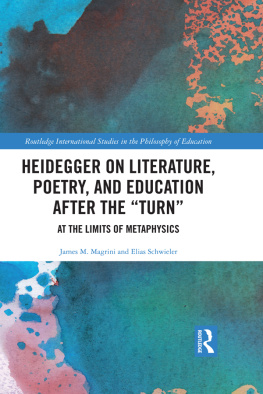
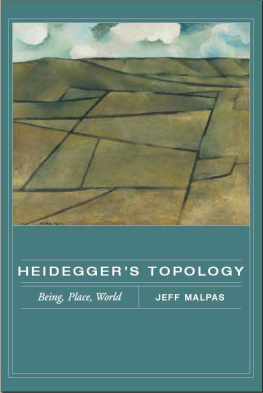
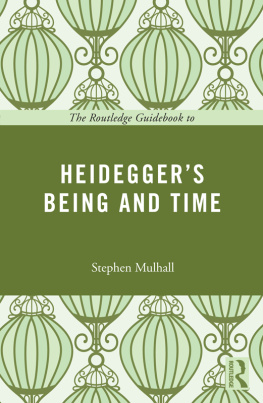
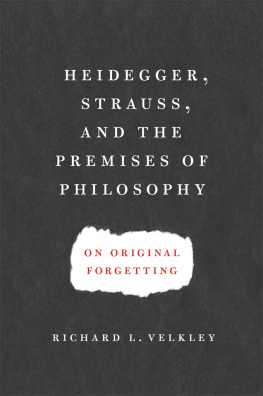
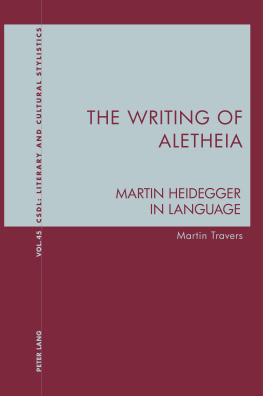
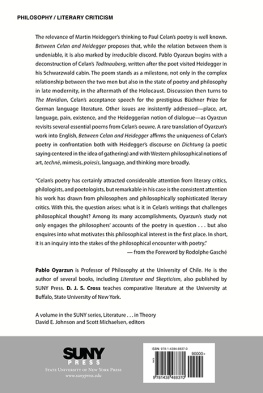
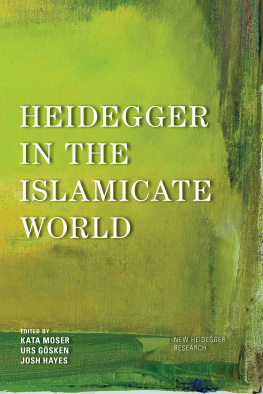

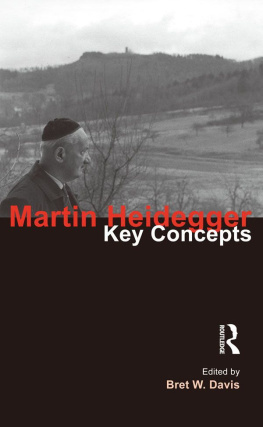
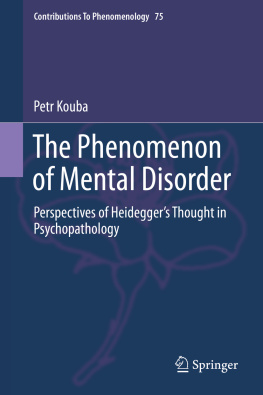
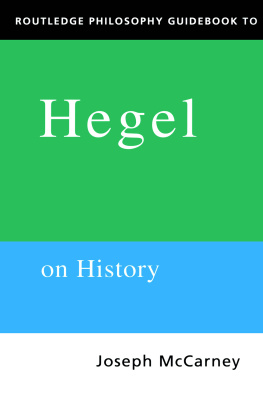
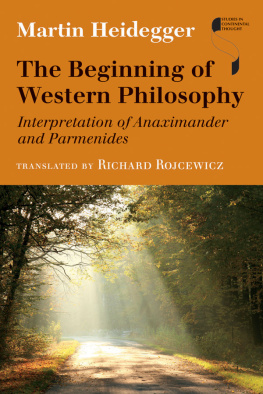

 The paper used in this publication meets the minimum requirements of the American National Standard for Information SciencesPermanence of Paper for Printed Library Materials, ANSI Z39.481992.
The paper used in this publication meets the minimum requirements of the American National Standard for Information SciencesPermanence of Paper for Printed Library Materials, ANSI Z39.481992.